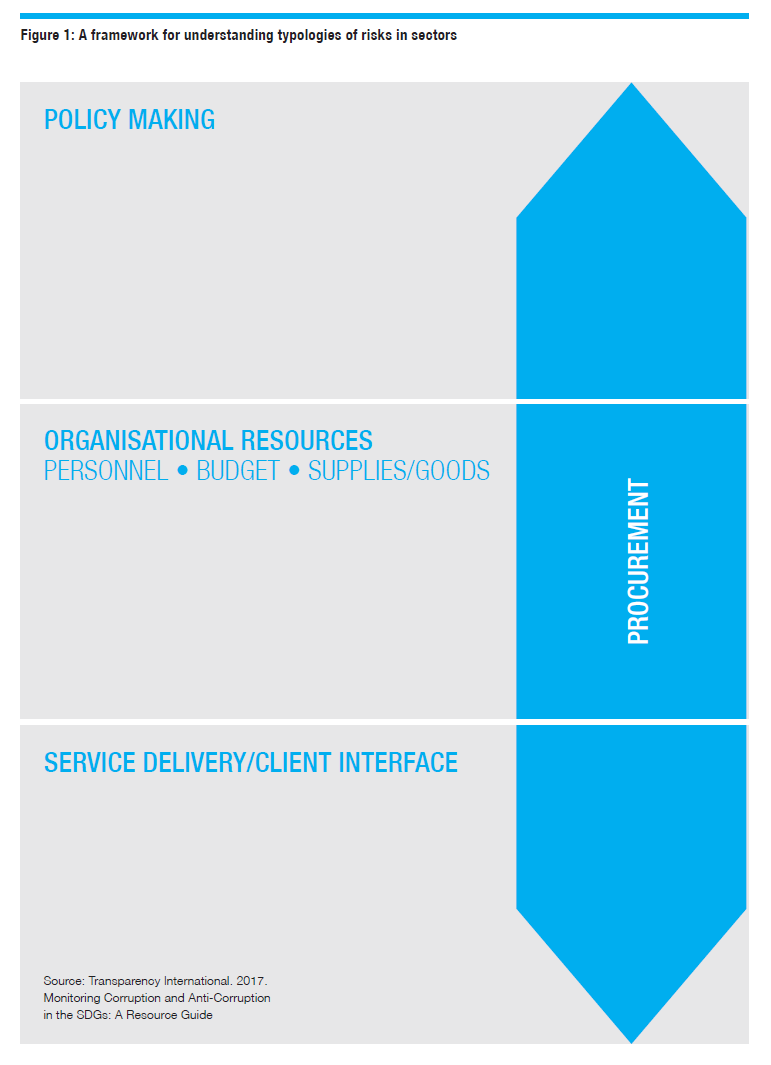Forms of corruption in service delivery
Corruption in service delivery takes a variety of guises and can be found at all levels of government and at all levels of the service delivery chain. The expansive nature of service delivery – which can involve infrastructure projects, contracting of private entities or public agencies, the management of organisational resources such as personnel, goods, supplies and budgets, as well as point of service interactions – presents a whole gamut of integrity risks.
- Bribery is the act of offering someone money, services or other inducements to persuade them to do something in return.
- A kick-back is a form of bribe referring to an illegal secret payment made as a return for a favour or service rendered. The term is often used to describe, in an “innocent” way, the returns of a corrupt or illegal transaction or the gains from rendering a special service.
- Speed money is paid to quicken processes caused by bureaucratic delays and shortages of resources. It normally occurs in offices where licences, permits, inspection certificates and clearance documents are processed.
- Extortion is the unlawful demand or receipt of property, money or sensitive information through the use of force or threat. A typical example of extortion would be when armed police or military personnel demand money for passage through a roadblock.
- Embezzlement is the misappropriation of property or funds legally entrusted to someone in their formal position as an agent or guardian. It also includes the diversion of property, funds, securities or any other thing of value entrusted to public officials by virtue of their position.
- Peddling influence occurs when individuals solicit benefits in exchange for using their influence to unfairly advance the interests of a particular person or party.
- Patronage refers to the support or sponsorship by a patron (a wealthy or influential guardian). Patronage is used, for instance, to make appointments to government jobs, facilitate promotions, confer favours and distribute contracts for work. Patronage transgresses the boundaries of political influence and violates the principles of merit and competition because providers of patronage (patrons) and receivers (clients) form a network to bypass existing lawful systems through which access to various resources is obtained.
- Cronyism/clientelism refers to the favourable treatment of friends and associates in the distribution of resources and positions, regardless of their objective qualifications.
- Nepotism is a form of favouritism that involves family relationships. Its most usual form is when a person exploits his or her power and authority to procure jobs or other favours for relatives.
Corruption can occur at various levels (policy making, organisations and client interface), the procurement processes that connect them, as well as the specific organisational resources that may be vulnerable to corruption.[1]

Footnotes
- [1]
See: Transparency International. 2017. Monitoring Corruption and Anticorruption in the SDGs: A Resource Guide. https://www.transparency.org/whatwedo/publication/monitoring_corruption_and_anti_corruption_in_the_sustainable_development_go
Chapters
Author
Iñaki Albisu Ardigó; Marie Chêne
Reviewer:
Matthew Jenkins
Contributing experts:
Umrbek Allakulov (Water Integrity Network)
Shaazka Beyerle (US Institute of Peace)
Simone Bloem (Center for Applied Policy)
Claire Grandadam (Water Integrity Network)
Jacques Hallak (Jules Verne University – Amiens)
Mihaylo Milovanovitch (Centre For Applied Policy)
Muriel Poisson (International Institute for Educational Planning (IIEP-UNESCO)
Juanita Riano (Inter-American Development Bank)
Marc Y. Tassé (Canadian Centre of Excellence for Anti-Corruption)
Vítězslav Titl (University of Siegen)
Davide Torsello (Central European University Business School)
Patty Zakaria (Royal Roads University)
Date
01/09/2017
